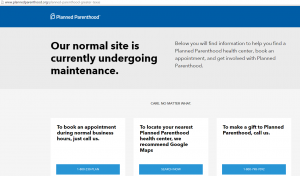With their Greater Texas-area website “undergoing maintenance” and today’s release of the fourth Planned Parenthood baby body parts video, I’m wondering if Texas Supreme Court Justice Eva Guzman realizes she may have protected Planned Parenthood from disclosing records under the Texas Public Information Act.
On June 26, 2015 in a 6-3 decision with the majority opinion written by Justice Eva Guzman, the Texas Supreme Court ruled a non-profit entity contracting with the City of Houston that is not “wholly or partially sustained by public funds” does not have to disclose how those public funds are spent.
Think about this.
Here’s the first paragraph of the majority opinion in the Greater Houston Partnership v. Ken Paxton, Texas Attorney General; and Jim Jenkins, Respondents:
The question presented here is whether a private entity operating like a
chamber of commercestate-sanctioned cancer screening agency is a governmental body subject to public disclosure of its private business affairs under the Texas Public Information Act. In seeking to promote the public’s legitimate interest in transparent government, the Act imposes considerable obligations on “governmental bod [ies]”. Importantly, the statutory definition of “governmental body” extends only to “the part, section, or portion of an organization, corporation, commission, committee, institution, or agency that spends or that is supported in whole or in part by public funds.” See TEX. GOV’T CODE 552.003 (1)()A)(xii) (emphasis added). This operates to prevent nominally private entities whose work might otherwise qualify them as defacto public agencies from circumventing the Act’s disclosure requirements. This case requires us to decide whether the term “supported” encompassesprivate entitiesPlanned Parenthood affiliates contracting at arm’s length with the government to provide general and specific services or whether the term properly includes only those entities that could not perform similar services without public funds and, are thus, sustained—in whole or in part—by such funds.
In this May 2015 article the Texas Tribune wrote some Planned Parenthood affiliates were funded in 2014 with $2.4 million in state funds under the state’s Breast and Cervical Cancer Services program.
How were those public funds spent?
Were or are those Planned Parenthood affiliates “supported in whole or in part by public funds”?
Could Planned Parenthood perform similar services without public funds and, are thus, sustained—in whole or in part—by such funds?
Here’s the second paragraph of the GHP majority opinion:
When a
private entityPlanned Parenthood affiliate enters into a contract and receives government funds in exchange for its services,the entity’sPlanned Parenthood affiliates right to conduct its affairs confidentially may be in tension with the public’s right to know how government funds are spent. Transparency, openness, and accountability in the government are all of fundamental importance. However, these important policy objectives cannot extinguish the privacy rights properly belonging toprivate business entitiesPlanned Parenthood affiliates in Texas. By liberally authorizing public access to government record while simultaneously shielding private business from unwarranted interference, the Legislature carefully balances these conflicting interests. Mindful of the delicate equilibrium between these equally compelling concerns, we conclude that the term “supported,” which helps define the breadth of the Act, unambiguously includes only those entities at least partially sustained by public funding. Because the statutory language is unambiguous, we need not consider the accuracy or vitality of the test articulated in Kneeland v. National Collegiate Athletic Ass’n, 850 F.2d224 (5th Cir. 1988), which the Attorney General’s Open Records Division has traditionally applied to private entities in cases involving open-record requests.
Since 1988—over 27 years– the Texas Attorney General’s office has applied the Kneeland test to private non-profit entities in open records cases.
Disregard the test articulated in a Fifth Circuit case? A test used for over 27 years?
Meh.
Finally, the third paragraph from the majority opinion:
Here,
Greater Houston Partnership,Planned Parenthood, a nonprofit corporation providingeconomic-developmentcancer screening services to theCityStateand other clientspursuant to quid pro quo contracts, contests whether it is a “governmental body” in whole or in part. Applying Kneeland, the Attorney General and lower courts held that it is. We hold, however, thatGreater HoustonPartnershipPlanned Parenthood is not a “governmental body” under the Texas Public Information Act because it is not wholly or partially sustained by public funds; we therefore reverse the court of appeals’ judgement and render judgement forGreater Houston PartnershipPlanned Parenthood.
So can you file an open records request under the Texas Public Information Act and successfully argue that Planned Parenthood affiliates are funded in part with public money?
Do Planned Parenthood affiliates participate in a quid pro quo contract with the State of Texas to provide Breast and Cervical Cancer Screening services in exchange for $2.4 million dollars?
Could you perhaps obtain Planned Parenthood’s disbursement registers to see how they spent that $2.4 million in state taxpayer money?
Does Texas Supreme Court Justice Eva Guzman realize she may have protected Planned Parenthood from disclosing records under the Texas Public Information Act?
